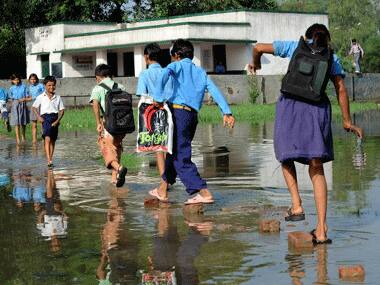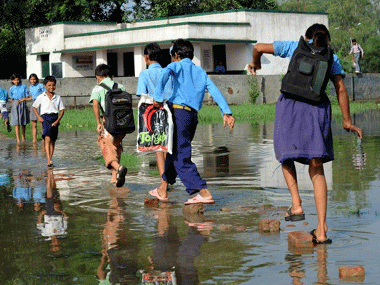New Delhi: Parents of nursery school students in Delhi and education professionals said that the Delhi High Court judgement will only benefit private schools who have been practicing these discriminatory processes. “I am very surprised and disappointed about the judgement. The Centre’s stand of not allowing children below 6 years in pre-school to avail the RTE is absolutely discriminatory. Why should they not fall under the ambit of the RTE? Education is meant to be for all who go to school and that’s what the Right to Education is. On one hand they are saying do not discriminate, but on the other, they themselves are discriminating among the kids by age and furthering the interests of private schools,” said K. Suresh Kumar, a South Delhi resident, and a father of a three-year-old. [caption id=“attachment_631717” align=“alignleft” width=“380”]  AFP.[/caption] The Delhi High Court today upheld that the RTE Act does not impose or apply to nursery or pre-school, with the exception of the provision to reserve 25 percent seats for the economically weaker sections (EWS). It however observed that it was the “right time for the government” to amend the RTE Act and suggested that the government amend it, so that it becomes applicable to children below six years of age. Counsellors in the education sector agree. “I believe that when something is a right it should be applicable to all citizens of India – which would include all ages. The signal that the government and the court judgement is giving society today is that of creating a divided and segmented society. A rule should be applied to all uniformly and not on a pick and choose basis. The Right to Education is a “right” and not a reservation, so why should it work like one?” Rajan Arora, founder of schooladmissions.in, India’s first admission related guidance and counselling website told Firstpost. “This will only allow private schools to monopolise education and continue the bias they are propagating. This will also in a sense open the realm of education to privatization,” Arora said. K. Suresh Kumar, who has a three-and-half-years-old son, told Firstpost that because of skewed and unfair policies like this, many children like his son will be the sufferers. Kumar applied to 25 schools for admission for his son. Finally, it was just one school which offered admission to his son. “I have been living in Delhi for 20 years now and applied for in 25 schools for my son who will begin school this year. In 2-3 schools my kid’s name came up for a draw but he wasn’t selected. Only 3-4 schools of the 25 showed any positive response,” he said. “How can you have a different set of rules for different children. If EWS children are covered under RTE then how can the constitution of India have different rules for the general category. It’s a mockery of the system. The main sufferers in this are the children who belong to the ‘Economically Middle Section’ where the non alumni/sibling parents do not have money and/or contacts to purchase management quota seats,” said Sumit Vohra, founder and administrator of www.admissionsnursery.com, another nursery education guidance website. The High Court decision — which was a setback of sorts for parents hoping for a more unbiased system of admittance into nursery school – was in response to a petition by NGO Social Jurist, which challenged the notifications issued by the Centre and the Delhi Government in 2010 that gave private unaided schools autonomy to formulate an admission policy based on a category-based system. But, Ashok Agarwal, adviser at the Social Jurist, told Firstpost that they will not lose hope and will appeal against the judgement in the Supreme Court. “We have decided to take dual action. One, we will go to the Supreme Court saying that RTE act covers 0-14 yrs and not 6-14 yrs. So HC cannot uphold the Centre’s stand. Two, we will also file a challenge against the High Court’s judgement next week,” Agarwal said. However, Agarwal said that there was also a positive message in the judgement – that the HC too is of the opinion that the regulation dealing with the pre primary crisis needs to be addressed and that pre-primary education needs to be brought to par with the RTE Act. “Though we have held that Right to Education Act is not applicable to nursery schools, in our opinion there cannot be any difference yardstick to be adopted for education to children up to the age of 14 years irrespective of the fact that it applies to only elementary education. It is the right time for the Government to consider the applicability of Right to Education Act to the nursery classes as well, as in many of the States admissions are made right from the nursery classes and the children so admitted are automatically allowed to continue from Class-I. In that sense, the provisions of Section 13 would be rendered meaningless insofar as it prohibits screening procedure at the time of selection. Importance of education is per se applicable to every child right from admission to nursery classes till it completes the eighth standard," the Delhi High Court judgement states. Another parent, Vinit Seth, told Firstpost that the Delhi High Court judgement for this year was a correct one. “It is something which is correct and is what should have happened. For one, all rules and regulations have problems and the government should have thought about it earlier. If the government now makes any change it will be chaotic for every child joining nursery this year,” said Seth, who has a 3.5 year old son who will start nursery this year. “For the future they should make some rules and amendments if required,” he said.
Parents of nursery school students in Delhi and education counsellors said that the Delhi High Court judgement will only benefit private schools who have been practicing these discriminatory processes.
Advertisement
End of Article


)
)
)
)
)
)
)
)
)



